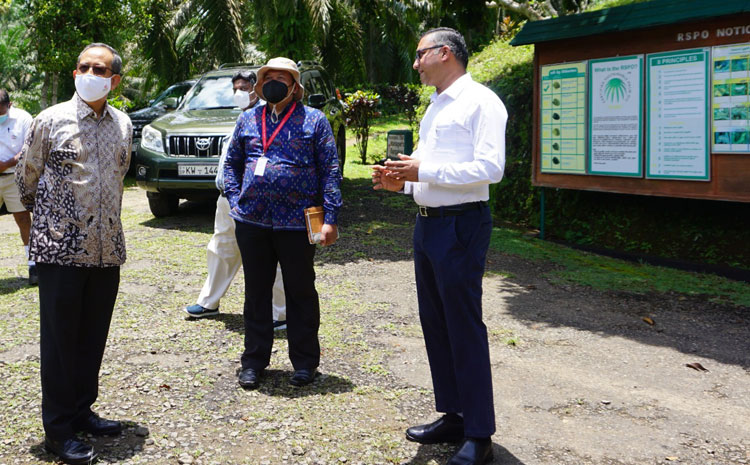October, 5, 2021

The Ambassador of Indonesia, H.E.I Gusti Ngurah Ardiyasa recently paid an official visit to Watawala Plantations, one of Sri Lanka’s largest, and pioneering plantations, within the agricultural industry.
On the 21st of September, the Ambassador together with Mr Rasyid Mahmuddin, First Secretary at the Embassy of Indonesia in Colombo, visited the plantation on a special invitation extended by Watawala Plantations. The visit was organised to observe the field and the processing center operations at the Watawala plantation are aligned towards the concept of environmental sustainability, as well as the initiatives were taken in implementing and obtaining Roundtable on Sustainable Palm Oil (RSPO) certification.
As countries across the globe, continue to look at holistic approaches to implement sustainable agricultural practices, this has created a stronger need for innovation within the agricultural industry. Palm oil cultivation plays a vital role in supporting the economic development and livelihood of many local communities in Sri Lanka.
The palm oil industry in Indonesia has been implementing the best practices of sustainability under a program called the ‘Indonesian Sustainable Palm Oil (ISPO). Similar to Indonesia, Sri Lanka is now significantly implementing the concept of sustainable oil palm cultivation adhering to stringent sustainability criteria related to social, environmental and economic good practices. This has resulted in a direct positive contribution successfully achieving 11 of the United Nations Sustainable Development Goals (SDGs). The adoption of sustainable oil palm production schemes offers the opportunity to improve many indicators of the socio-economic impact, linked to the expansion of oil palm production.
During his visit to the Nakiyadeniya estate, where palm oil cultivation first began in Sri Lanka, the Ambassador observed the agronomic practices carried out to better understand the quality of the cultivation process. The ambassador next met with key industry stakeholders, scientists, and Indonesian industrial experts to convey his thoughts. The Ambassador showcased his appreciation for the many initiatives undertaken by the management of Watawala towards implementing sustainable agricultural practices at all plantations while securing the wellbeing of the local communities through their expansive corporate social responsibility schemes. He welcomed Watawala’s ability to obtain and continuously maintain the RSPO certification and noted how Watawala sets the benchmark in sustainable palm oil cultivation in Sri Lanka.
As common palm oil-producing countries, it is important for Indonesia and Sri Lanka to explore the possibility of building closer collaboration and partnership by sharing knowledge and best practices on the whole supply chain of the industry. Palm oil-producing countries should be at the forefront of sustainable farming and at the same time improving local communities’ livelihoods and strengthening the capacity and welfare of smallholders producing the most productive, most sustainable and most versatile vegetable oil in the world. It is therefore in the interests of both countries to ensure the palm oil industry benefit the two nations in attaining the United Nations Sustainable Development Goals 2030.
Video Story